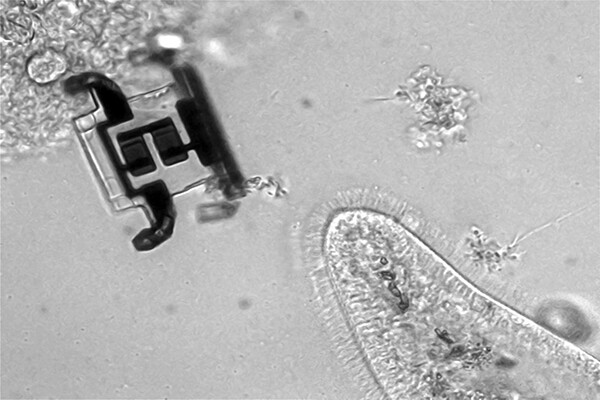5/18
Biology
Solution to a decades-old mitochondria mystery could lead to new disease treatments
Perelman School of Medicine scientists identified a key protein involved in fueling the cells’ power plants.
Middle-aged individuals may be in a perpetual state of H3N2 flu susceptibility
Individuals’ immunological imprint from early childhood infection likely lessens the virus’ severity, but does not prevent infection.
Major advancement in islet cell transplantation for treating Type-1 diabetes
Penn researchers invent a method for keeping donor insulin-producing cells alive long-term under the skin of patients.
Engineers develop laser-controlled, cell-sized robots
Researchers at Penn Engineering are creating microscopic robots with semiconductor processing that can be controlled, and made to walk, as small as biological cells.
The perfect balancing act of inflammation rests on a single molecule
A new Penn study reveals a molecular mechanism that helps the body mount balanced responses to deadly infections.
‘Self-eating’ stem cell process may be the key to new regenerative therapies
A Penn study uncovers new roles of chaperone-mediated autophagy in how stem cells repair or regenerate damaged organs.
Advancing knowledge on archaea
An open-source data platform for researchers studying archaea is paving the way for new insights and educational opportunities.
300-million-year-old fish resembles a sturgeon but took a different evolutionary path
Tanyrhinichthys mcallisteri recasts the notion of what it means to be a “primitive” vertebrate, according to paleontologists Lauren Sallan and Jack Stack.
Additional challenges in bringing research online
As research on campus slowly restarts, those whose work requires field surveys, large-scale collaborations, or travel face additional challenges in bringing their research back online.
A link to pregnancy complications with assisted reproduction discovered
Researchers find that embryo culture is a factor that may lead to more specific placental defects with assisted reproduction processes.
In the News
Bird flu virus has been spreading in U.S. cows for months, RNA reveals
Louise Moncla of the Veterinary School of Medicine says that the bird flu virus is clearly being transmitted to cows in some way.
FULL STORY →
Man does DNA test, not prepared for what comes back ‘unusually high’
César de la Fuente of the School of Engineering and Applied Science and Perelman School of Medicine says that Neanderthal DNA provides insights into human evolution, population dynamics, and genetic adaptations, including correlations with traits such as immunity and susceptibility to diseases.
FULL STORY →
When is the best time to take L-theanine—morning or night?
According to Colleen Tewksbury of the School of Nursing, research suggests that L-theanine may help support stress management, sleep, and potentially weight management.
FULL STORY →
Is the flu shot market a slam dunk for mRNA vaccines? Experts aren’t so sure
Scott Hensley of the Perelman School of Medicine is working on a flu vaccine to provide protection against 20 subtypes of flu that may pose a pandemic threat in the future.
FULL STORY →
Thanks, Neanderthals: How our ancient relatives could help find new antibiotics
A study by César de la Fuente of the Perelman School of Medicine and colleagues used AI to recreate molecules from ancient humans that could be potential candidates for antimicrobial treatments.
FULL STORY →
Long COVID brain fog may originate in a surprising place, say scientists
A study by Christoph Thaiss and Maayan Levy of the Perelman School of Medicine and colleagues finds that long COVID’s neurological symptoms, like brain fog, memory loss, and fatigue, may stem from serotonin reduction.
FULL STORY →












